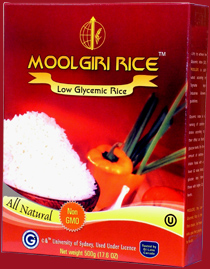There’s a very odd story in The Hindu. It describes the launch of a “new variety of low glycemic rice“. Low glycemic foods are digested more slowly and create less of a spike in blood sugar, and have been pushed for diabetics, weight loss and sundry other benefits. One of the nice things about basmati rice, quite apart from its wonderful fragrance and flavour, is a relatively low glycemic index (although strictly speaking it has a medium GI). The new rice is not a basmati rice.
 The rice, called Moolgiri, is marketed by Taj Mahal Agro Industries, and according to independent tests does indeed have a glycemic index of 54, just in the “low” category. That could be very interesting news, especially if Moolgiri is one of the many thousands of rice varieties that just happens to have this property. But the story got murkier the more I looked into it.
The rice, called Moolgiri, is marketed by Taj Mahal Agro Industries, and according to independent tests does indeed have a glycemic index of 54, just in the “low” category. That could be very interesting news, especially if Moolgiri is one of the many thousands of rice varieties that just happens to have this property. But the story got murkier the more I looked into it.
For a start, it is not a variety but a trade name. A rice with its own web site! There’s all kinds of information there, but not an awful lot about what exactly makes Moolgiri special. We learn that:
Moolgiri rice is a clear blend of tradition and technology. After ten years of continuous research Tajmahal Agro industries identified suitable traditional grain and developed innovative process to achieve Moolgiri.
There’s also a lot about how it is grown, tested and so on. But you have to dig deeper to discover that the variety itself is called manisamba, and that it
undergoes a patented process to remove 70% of the starch content.
So I did a little more digging, in SINGER, and discovered that there is a rice called Pamani samba, that it was collected in India, and that there is a sample (of unknown status) in the genebank at the International Rice Research Institute. And there the trail goes cold. There seems to be no further information about this wonderful variety. No “special traits” are noted.
All of which is both satisfying and unsatisfying (rather like a meal of high GI rice?). I found the variety. But no more about it. Maybe the special patented process could do the same to any old rice? I doubt it, but you never know. And maybe there are actually rice varieties out there that would have a low GI without a special patented process. I think that’s what I had been hoping, that there existed a rice that, polished and purified, would be have a naturally low glycemic index. Alas, it ain’t so.
 The rice, called Moolgiri, is marketed by Taj Mahal Agro Industries, and according to independent tests does indeed have a
The rice, called Moolgiri, is marketed by Taj Mahal Agro Industries, and according to independent tests does indeed have a  GRAIN, an NGO, has published a
GRAIN, an NGO, has published a